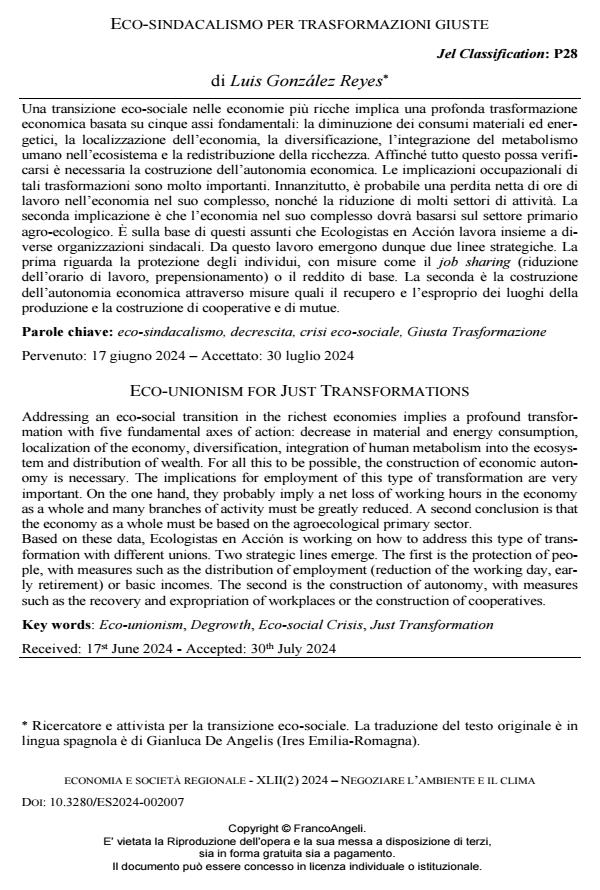Eco-unionism for just transformations
Journal title ECONOMIA E SOCIETÀ REGIONALE
Author/s Luis González Reyes
Publishing Year 2024 Issue 2024/2
Language Italian Pages 12 P. 91-102 File size 257 KB
DOI 10.3280/ES2024-002007
DOI is like a bar code for intellectual property: to have more infomation
click here
Below, you can see the article first page
If you want to buy this article in PDF format, you can do it, following the instructions to buy download credits

FrancoAngeli is member of Publishers International Linking Association, Inc (PILA), a not-for-profit association which run the CrossRef service enabling links to and from online scholarly content.
Addressing an eco-social transition in the richest economies implies a profound transfor-mation with five fundamental axes of action: decrease in material and energy consumption, localization of the economy, diversification, integration of human metabolism into the ecosys-tem and distribution of wealth. For all this to be possible, the construction of economic au-tonomy is necessary. The implications for employment of this type of transformation are very important. On the one hand, they probably imply a net loss of working hours in the economy as a whole and many branches of activity must be greatly reduced. A second conclusion is that the economy as a whole must be based on the agroecological primary sector. Based on these data, Ecologistas en Acción is working on how to address this type of trans-formation with different unions. Two strategic lines emerge. The first is the protection of people, with measures such as the distribution of employment (reduction of the working day, early retirement) or basic incomes. The second is the construction of autonomy, with measures such as the recovery and expropriation of workplaces or the construction of coop-eratives.
Keywords: Eco-unionism, Degrowth, Eco-social Crisis, Just Transformation
Jel codes: P28
- González Reyes L., Almazán A. (2023). Decrecimiento: del qué al cómo. Barcelona: Icaria.
- Heinberg R., Fridley D. (2016). Our Renewable Future. Washington: Island Press.
- Lallana M. (2024). Plan de transición ecosocial para Mecaner. Garúa, febrero -- <https://www.garuacoop.es/>.
- Laval C., Dardot P. (2015): Común. Barcelona: Gedisa.
- Bhaskar A., Abhishek R., Assadi M., Somehesaraei H.N. (2022). Decarbonizing primary steel production: Techno-economic assessment of a hydrogen based green steel production plant in Norway. Journal of Cleaner Production, 350(May).
- Bellver J. (2019). Costes y restricciones ecológicas al capitalismo digital. Papeles relaciones ecosociales y cambio global, 144: 59-77.
- Brand U., Wissen M. (2021). Modo de vida imperial. Vida cotidiana y crisis ecológica del capitalismo. Buenos Aires: Tinta limón.
- Conejo A.N., Birat J.P., Dutta A. (2020). A review of the current environmental challenges of the steel industry and its value chain. Journal of environmental management, 259(Avril).
- De Castro C. (2019). Reencontrando a Gaia. Málaga: Ediciones del Genal.
- De Decker K. (2024). How to Escape From the Iron Age?. Low-tech Magazine --<https://solar.lowtechmagazine.com/2024/03/how-to-escape-from-the-iron-age/>.
- Fernández Durán R., González Reyes L. (2018). En la espiral de la energía. Madrid: Libros en Acción, Baladre.
- García-Olivares A. (2015). Sustituibilidad de los combustibles fósiles. The Oil Crash, 18 de diciembre -- <https://crashoil.blogspot.com>.
- González Reyes L., Almazán Gómez A., Lareo Fernández Á., Actis Mazzola W., Bueno Morera L. M., Madorrán Ayerra C., Santiago Muiño E., de Benito Morán C. (2019). Escenarios de trabajo en la transición ecosocial 2020-2030. Madrid: Ecologistas en Acción.
- López S. (2024). ¡Hablemos de acero! Ecologistas en Acción -- <https://www.ecologistasenaccion.org/>.
- Oteros E., Monasterio C., Gutiérrez A., Hernández M., Álvarez I., Albarracín D., González Reyes L., Fernández J. L., Amo de Paz G., García M., Hevia V., Iniesta I., Quintas C. (2023). Biodiversidad, economía y empleo en España. Análisis y perspectivas de futuro. Madrid: Amigos de la Tierra, Ecologistas en Acción - Seo BirdLife -Wwf.
- Riahi K., Kriegler, E., Johnson N., Bertram C., den Elzen M., Eom J., Schaeffer M., Edmonds J., Isaac M., Krey V., Longden T., Luderer G., Méjean A., McCollum D. L., Mimai S., Turton H., van Vuuren D. P., Wada K., Bosetti V., Capros P., Criqui P., Hamdi-Cherif M., Kainuma M., Edenhofer O. (2015). Locked into Copenhagen pledges — Implications of short-term emission targets for the cost and feasibility of long-term climate goals. Technological Forecasting and Social Change, 90(A-January): 8-23.
- Ruault J.-F., Dupré la Tour A., Evette A., Allain S., Callois J.-M. (2022): “A biodiversity-employment framework to protect biodiversity”. Ecological Economics, 119(January).
- World Steel (2023). World Steel in figures 2023 -- <https://worldsteel.org/data /world-steel-in-figures-2023/>.
- Tverberg G. (2022): The world’s energy problem is far worse than we’re being told -- <https://oilprice.com/Energy/Crude-Oil/The-Worlds-Energy-Proble m-Is-Far-Worse-Than-Were-Being-Told.html>.
- Unep (2019). Emissions Gap Report 2019. United Nations.
- Valero A., Valero A., Almazán A. (2021). Thanatia. Los límites minerales del planeta. Barcelona: Icaria.
Luis González Reyes, Eco-sindacalismo per trasformazioni giuste in "ECONOMIA E SOCIETÀ REGIONALE " 2/2024, pp 91-102, DOI: 10.3280/ES2024-002007